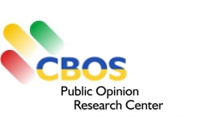| LATESTPUBLICATIONS Polish Public Opinion May 2023
 | Opinions about the grain crisis
|
 | Views about Pope John Paul II
|
 | Main sources of information
|
 | Subjective safety and crime threat
|
"Opinions and Diagnoses"no 48
Young Poles in CBOS Surveys 1989–2021
no 49
Youth 2021
no 50
Secularisation in Poland
Reports | Television as a Source of Information on Current Events
|
 | Social Moods in May
|
 | Sources of Information about Events in the Country and in the World
|
 | Poles towards the War in Ukraine and the Grain Crisis
|
 | Opinions about TV and Radio Stations
|
 | Psychological Profiles of Political Party Electorates 2023
|
 | Using Internet in 2023
|
 | Voting Confidence of Political Party Electorates and Preferences of Undecided
|
|
|
Almost Half of Polish People Blame the Grain Crisis on the Government
| In the May survey people were asked who they thought was most responsible for the problems, dubbed the grain crisis, brought about by the uncontrolled influx of Ukrainian grain into Poland. Almost half (45%) saw the government as being chiefly to blame, first by reacting sluggishly to the problems farmers were reporting, then acting too precipitously. In second place (20%) were the grain traders and in third (16%) the European Union. Ukraine itself was least often held responsible (2%). Almost one in five respondents (17%) had no opinion on this subject.
| |
| The Polish government was held responsible particularly by inhabitants of the biggest cities, respondents with higher education, highest per capita incomes, not involved in religious practice and professing leftwing views. Equally, in the socioeconomic group most affected – the farmers – the view that the government was mostly to blame was also dominant.
| More on this subject in the CBOS report.
| This ‘Current Events and Problems’ survey (397) was conducted using a mixed-mode procedure on a representative sample of named adult residents of Poland, randomly selected from the National Identity Number (PESEL) register. Respondents independently selected one of the following methods: Computer Assisted Personal Interview (CAPI); Computer Assisted Telephone Interview (CATI), respondents receiving researchers’ telephone numbers in an introductory letter from CBOS; Computer Assisted Web Interview (CAWI), where respondents filled in the online questionnaire independently, gaining access by means of a login and password provided in an introductory letter from CBOS. The survey was carried out between 8–18 May 2023 inclusive on a sample of 1056 people (57.4% using the CAPI method, 25.9% CATI and 16.7% CAWI). CBOS has been conducting statutory research using the above procedure since May 2020, stating in each case the percentage of personal, telephone and internet interviews.
|
|



